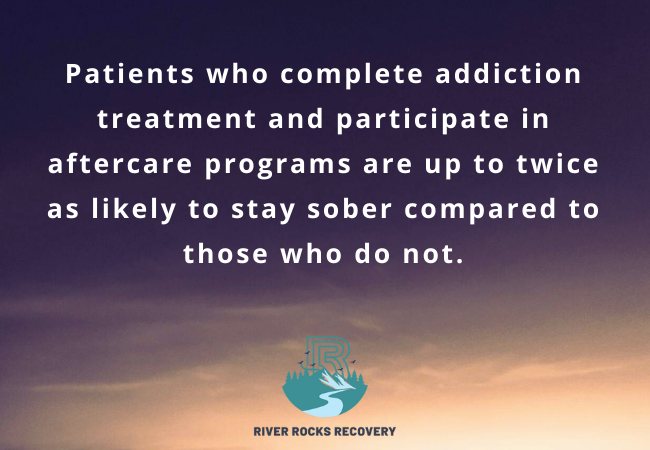Taking the first step toward recovery from drug addiction is often the most difficult but also the most empowering. Entering a Drug Rehab Treatment in Ohio marks a profound commitment to reclaiming your health, relationships, and future. Whether you’re struggling with opiates, methamphetamines, or other substances, understanding the initial stages of rehab can help reduce fear, set expectations, and prepare you for meaningful progress.
At River Rocks Recovery, we walk beside you from the very beginning. From medically supervised detox to outpatient treatment and aftercare planning, our goal is to provide structure, healing, and long-term recovery for every individual.
1. Recognizing the Problem and Making the Call
The decision to seek help doesn’t happen overnight. It usually follows a period of emotional, physical, or psychological distress caused by substance use. Many clients reach a “rock bottom” moment before reaching out, while others are urged by concerned family or friends. Either way, acknowledging the need for help is the first true milestone on your recovery journey.
Common signs you need professional addiction treatment include:
- Inability to stop using despite consequences
- Physical dependence or withdrawal symptoms
- Legal, financial, or relationship troubles due to substance use
- Loss of interest in previously enjoyed activities
- Failed attempts to quit on your own
No matter where you are in your journey, reaching out to an Addiction Treatment Center Ohio like River Rocks Recovery is a sign of strength, not weakness.
2. Comprehensive Clinical and Medical Assessment
Once you initiate contact, our admissions team conducts a thorough clinical assessment to evaluate your unique situation. This process ensures your treatment is tailored to your needs—not based on a template, but on your life.
Assessment includes:
- Substance use history (type, duration, frequency)
- Co-occurring mental health disorders (e.g., depression, anxiety, PTSD)
- Medical conditions (diabetes, heart issues, infectious diseases)
- Medication use
- Family history of addiction or mental illness
- Past treatments or hospitalizations
This allows our team to determine if you need detox services, intensive outpatient support, or a Partial Hospitalization Program in Ohio to start.
3. Preparing for Admission: What to Bring and Expect
Once admitted into one of our programs, the next step is preparing for your stay. Depending on the level of care, your time in treatment could range from a few hours a week to daily structured support. For example, in a Partial Hospitalization Program in Ohio, you’ll attend therapy sessions five days a week, typically 6–8 hours a day.
What to bring:
- Valid ID and insurance card
- Comfortable clothing and shoes
- Any prescribed medications (in original containers)
- Toiletries (alcohol-free)
- Notebook or journal
- A list of emergency contacts
Avoid bringing items that are distracting, emotionally triggering, or prohibited (e.g., drugs, alcohol, weapons, electronic cigarettes, or large sums of cash).
4. Detox: Clearing the Body, Preparing the Mind
For individuals with moderate to severe substance dependence—especially those entering Opiate Rehab Treatment in Ohio or Meth Rehab Treatment in Ohio—detox is often the first clinical stage.
Detox services may include:
- 24/7 medical monitoring
- Medication-assisted treatment (MAT) for comfort and safety
- IV fluids and nutritional support
- Counseling and emotional support
- Transition planning for continued treatment
The detox process typically lasts 5–10 days, but this varies based on the type of substance, how long you’ve used it, and your physical health.
Most importantly, detox is not a cure, but a starting point. Once you’re physically stable, the real work of healing begins through therapy and structured care.
5. Orientation and Daily Routine Introduction
After detox or upon entering a non-detox program, you’ll begin orientation into your specific treatment path. This stage is critical in helping you feel safe, welcomed, and supported.
You’ll meet with:
- Case managers
- Primary therapist
- Medical providers
- Support staff
They’ll explain:
- Your personalized treatment plan
- Weekly goals and assignments
- Group therapy schedules
- Rules and community expectations
Whether you’re starting a Drug Rehab Treatment in Ohio through PHP, IOP, or OP, the first week is focused on building trust and structure.
6. Creating a Personalized Treatment Plan
No two recovery paths are alike. That’s why individualized treatment planning is a core part of the early stages. Working with clinicians, you’ll develop a plan based on:
- Type and severity of addiction
- Co-occurring mental health needs
- Past traumas or family dynamics
- Long-term goals (e.g., employment, education, rebuilding relationships)
Your plan may include:
- Cognitive Behavioral Therapy (CBT)
- Dialectical Behavior Therapy (DBT)
- Group therapy and process groups
- Family counseling
- Trauma-informed care
- Mindfulness, fitness, or expressive therapies
As your treatment evolves, this plan is revisited weekly to ensure it remains aligned with your progress.
7. Establishing a Safe and Supportive Environment
In the early stages of recovery, environment matters. River Rocks Recovery ensures that every client feels respected, seen, and understood. You’ll find a community of people who:
- Are also working toward sobriety
- Understand your struggles
- Can offer insights and peer support
- Encourage accountability and motivation
Peer support is especially beneficial in Intensive Outpatient Program in Ohio and Outpatient Program in Ohio, where group therapy is a key modality.
8. Addressing Mental Health and Dual Diagnosis
Many individuals entering rehab struggle with dual diagnosis—a combination of addiction and mental health disorders. In fact, national research shows that over 45% of individuals with substance use disorders also have co-occurring mental health conditions like anxiety, depression, or bipolar disorder.
We provide:
- Psychiatric evaluations
- Medication management
- Trauma treatment (e.g., EMDR)
- Ongoing mental health counseling
A dual diagnosis approach ensures your mental health isn’t left untreated while working through addiction. This is a cornerstone of quality Addiction Treatment Program Ohio offerings.

9. Building Coping Strategies and Life Skills
During the early stages of rehab, one of the most vital lessons is how to live without substances. Through skill-building workshops, you’ll begin learning tools that prepare you for a sober lifestyle.
These include:
- Identifying high-risk situations
- Coping with cravings and emotions
- Developing healthy routines
- Practicing self-care and nutrition
- Rebuilding time management and structure
You’ll also work with vocational counselors and social workers to start planning for post-treatment success.
10. Creating a Discharge and Aftercare Plan
Although it may seem early, planning for life after rehab begins the moment you walk through the door. An aftercare plan keeps your momentum strong as you re-enter everyday life.
Aftercare may include:
- Stepping down from PHP to IOP or OP
- Enrolling in sober living housing
- Continued individual therapy
- Peer recovery coaching
- Relapse prevention planning
A strong aftercare plan reduces relapse risk and supports long-term sobriety—a core goal for every Addiction Treatment Center Ohio client.
Why Choose River Rocks Recovery?
At River Rocks Recovery, we don’t just treat addiction—we treat people. Our Ohio-based rehab center offers a full continuum of care that includes:
- Evidence-based treatments
- Licensed, compassionate staff
- Trauma-informed and dual diagnosis capabilities
- Comfortable, healing-focused environment
- Flexible options like PHP, IOP, and OP
- Opiate and meth-specific rehab treatment
- Ongoing family and aftercare support
We tailor every plan to the individual, not just the symptoms. Whether you’re battling opiate dependence, methamphetamine use, or alcohol addiction, our team is ready to walk this path with you.
Conclusion
The path to healing starts with a single, powerful choice—to ask for help. The first steps into rehab can feel uncertain, but they’re also the beginning of hope, growth, and change.
At River Rocks Recovery, we specialize in guiding individuals through each stage of treatment with dignity and expertise. Whether you need detox, a Partial Hospitalization Program in Ohio, or are ready for a step-down into our Intensive Outpatient Program in Ohio, we’ll make sure your first steps are supported every inch of the way. You don’t have to walk this path alone. Call River Rocks Recovery today at 888-905-6281 to speak with our admissions team and take your first step toward lasting recovery in Ohio.
FAQs on First Steps in Drug Rehab
How do I know if I need to enter a drug rehab program in Ohio?
If you find it difficult to stop using drugs despite negative consequences, experience withdrawal symptoms, or feel your life is spiraling out of control due to substance use, it’s time to consider a Drug Rehab Treatment in Ohio. A clinical assessment from a treatment center like River Rocks Recovery can help determine the level of care you need.
What is the difference between PHP, IOP, and outpatient programs?
-
Partial Hospitalization Program in Ohio (PHP): Structured, daylong care (usually 5–6 days a week) without overnight stays.
-
Intensive Outpatient Program in Ohio (IOP): A step down from PHP, with therapy sessions several times a week for a few hours per day.
-
Outpatient Program in Ohio (OP): Flexible care designed for people who’ve stabilized in early recovery and need minimal clinical support.
Each level meets you where you are in your recovery journey and can be customized as your needs evolve.
Do I need to complete detox before entering treatment?
Yes, if you’re physically dependent on substances like opiates or methamphetamines, a medical detox is often required before starting therapy. River Rocks Recovery can coordinate detox services before you transition into our Addiction Treatment Program Ohio.
Can my family be involved in my treatment?
Absolutely. Family involvement is encouraged at River Rocks Recovery. We offer family therapy and educational sessions to help loved ones understand addiction, develop healthy communication skills, and support your recovery without enabling.
What if I have mental health issues alongside addiction?
River Rocks Recovery specializes in dual diagnosis treatment, meaning we address both your addiction and any co-occurring mental health conditions like anxiety, depression, PTSD, or bipolar disorder. This integrated approach improves long-term outcomes.




























